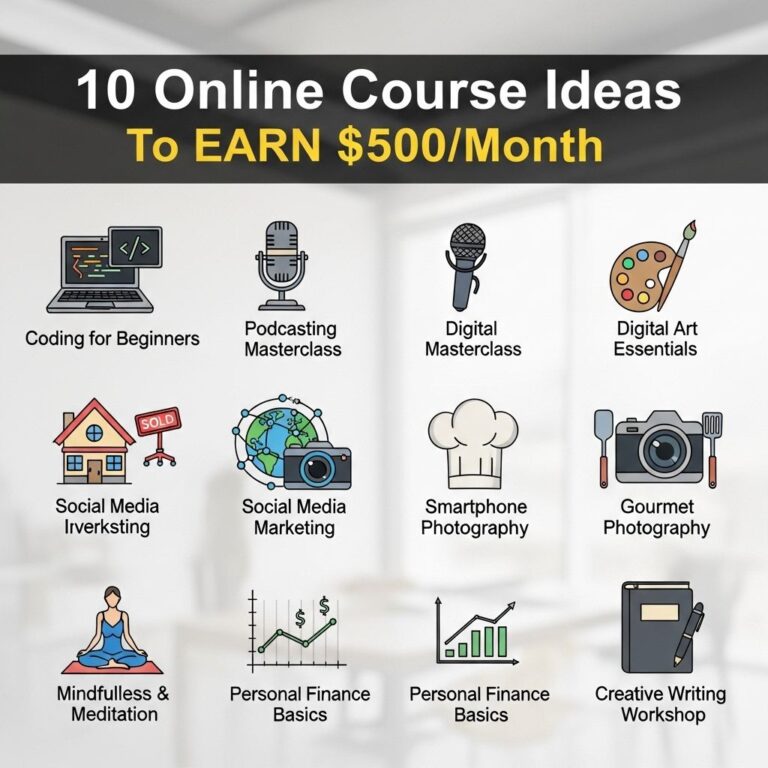In the digital era, online courses have emerged as a lucrative avenue for both educators and entrepreneurs. With the meteoric rise of e-learning platforms, creating and selling online courses has become more accessible than ever. Whether you’re a professional seeking to monetize your expertise or an entrepreneur looking to tap into a growing market, this guide will explore effective strategies and best practices to help you succeed in the online course landscape.
Table of Contents
Understanding the Online Learning Landscape
The global online education market is projected to reach over $375 billion by 2026. This growth is driven by several factors:
- Increased accessibility of the internet and smartphones
- Growing acceptance of online learning by institutions and employers
- Demand for flexible learning options that cater to diverse schedules
- Advancements in technology that enhance user experience
To capitalize on this trend, it is essential to understand your audience, their needs, and how best to deliver content that resonates with them.
Identifying Your Niche
Before diving into course creation, it’s crucial to identify a niche that aligns with your expertise and market demand. Consider the following steps:
1. Analyze Your Skills and Interests
Start by listing your skills, knowledge areas, and interests. Ask yourself:
- What topics am I passionate about?
- What expertise can I offer that others might find valuable?
2. Research Market Demand
Utilize tools like Google Trends, Udemy, and Coursera to identify trending topics and popular courses. This can help you pinpoint subjects that not only interest you but also have a market demand.
3. Evaluate the Competition
Check existing courses in your chosen niche. Look for gaps in the content or areas where you could provide a unique perspective. Consider the following factors:
- Course content quality
- Pricing strategies
- Student engagement and feedback
Course Creation: Steps to Success
Once you have identified your niche, the next step is to create a comprehensive and engaging online course. Here’s a streamlined process:
1. Define Learning Objectives
Establish clear learning outcomes for your course. What should students be able to achieve by the end of it? These objectives will guide your content development.
2. Outline Your Course Structure
Create a detailed outline that breaks down the course into modules and lessons. A well-structured course might look like this:
| Module | Topics | Duration |
|---|---|---|
| Module 1 | Introduction to the Topic | 1 week |
| Module 2 | Core Concepts | 2 weeks |
| Module 3 | Advanced Strategies | 2 weeks |
| Module 4 | Practical Applications | 1 week |
3. Create High-Quality Content
Your content should be engaging, informative, and easy to follow. Consider these formats:
- Video lectures
- Interactive quizzes
- Downloadable resources
- Discussion forums
4. Utilize Technology
Leverage online course platforms like Teachable, Thinkific, or Kajabi to host and distribute your course. These platforms offer various tools for:
- Content delivery
- Marketing automation
- Payment processing
Marketing Your Online Course
Creating a fantastic course is only half the battle; effective marketing is essential to attract students.
1. Build a Sales Funnel
A well-defined sales funnel helps convert visitors into students. This process can include:
- Content marketing (blog posts, videos, podcasts)
- Email marketing (lead magnets, newsletters)
- Social media promotion (Facebook, Instagram, LinkedIn)
2. Leverage SEO Strategies
Optimize your course landing page for search engines by using relevant keywords, creating valuable content, and ensuring your site loads quickly.
3. Engage with Your Audience
Interact with potential students through social media, webinars, or free workshops. Building relationships can significantly boost your credibility and course sales.
Monetization Strategies
There are various ways to monetize your online course effectively:
1. Pricing Models
Deciding on a pricing strategy is crucial. Consider these models:
- One-time payment
- Subscription model
- Payment plans
2. Upselling and Cross-Selling
Once students enroll in your course, offer additional products or advanced courses. This strategy increases average revenue per user.
3. Affiliate Marketing
Partner with other creators or brands to earn commissions on referrals. This can be an additional income stream while promoting high-quality products.
Feedback and Course Improvement
Gather feedback from your students through surveys and course evaluations. Use their input to make necessary revisions and enhance your course content continuously. Building a good reputation is vital for long-term success.
Conclusion
In 2025 and beyond, the potential for earning money through online courses remains immense. By understanding the market, creating valuable content, and implementing effective marketing strategies, you can successfully monetize your expertise. Embark on this journey with dedication and continual learning, and you will be well-equipped to thrive in the world of online education.
FAQ
How can I create an online course to make money in 2025?
To create an online course for profit in 2025, identify a niche you are passionate about, outline your course content, choose a suitable platform to host your course, and market it effectively through social media and email campaigns.
What are the best platforms to sell online courses in 2025?
Some of the best platforms to sell online courses in 2025 include Udemy, Teachable, Kajabi, and Thinkific, each offering unique features for course creators.
How much can I realistically earn from selling online courses?
Earnings from selling online courses can vary greatly, with some creators making a few hundred dollars a month, while others can earn thousands, depending on the course topic, marketing efforts, and audience size.
What topics are trending for online courses in 2025?
Trending topics for online courses in 2025 include digital marketing, personal finance, mental health, coding, and sustainability, catering to the evolving interests of learners.
How can I effectively market my online course?
To effectively market your online course, use SEO strategies, leverage social media ads, build an email list, collaborate with influencers, and offer free webinars or previews to attract potential students.
What resources do I need to create an online course?
Essential resources for creating an online course include a reliable computer, video recording equipment, editing software, a course platform, and marketing tools to promote your course.









